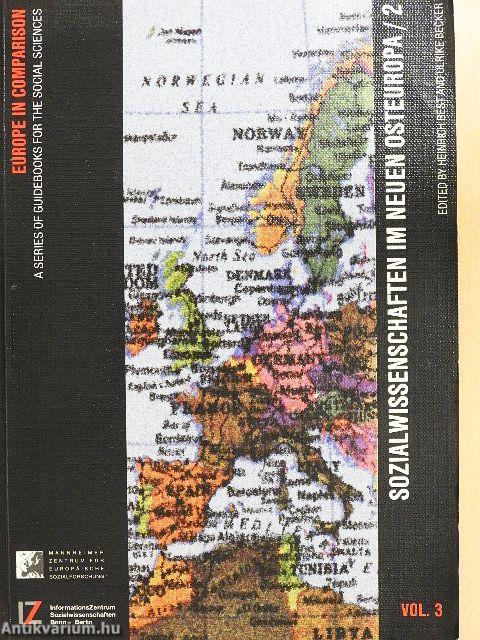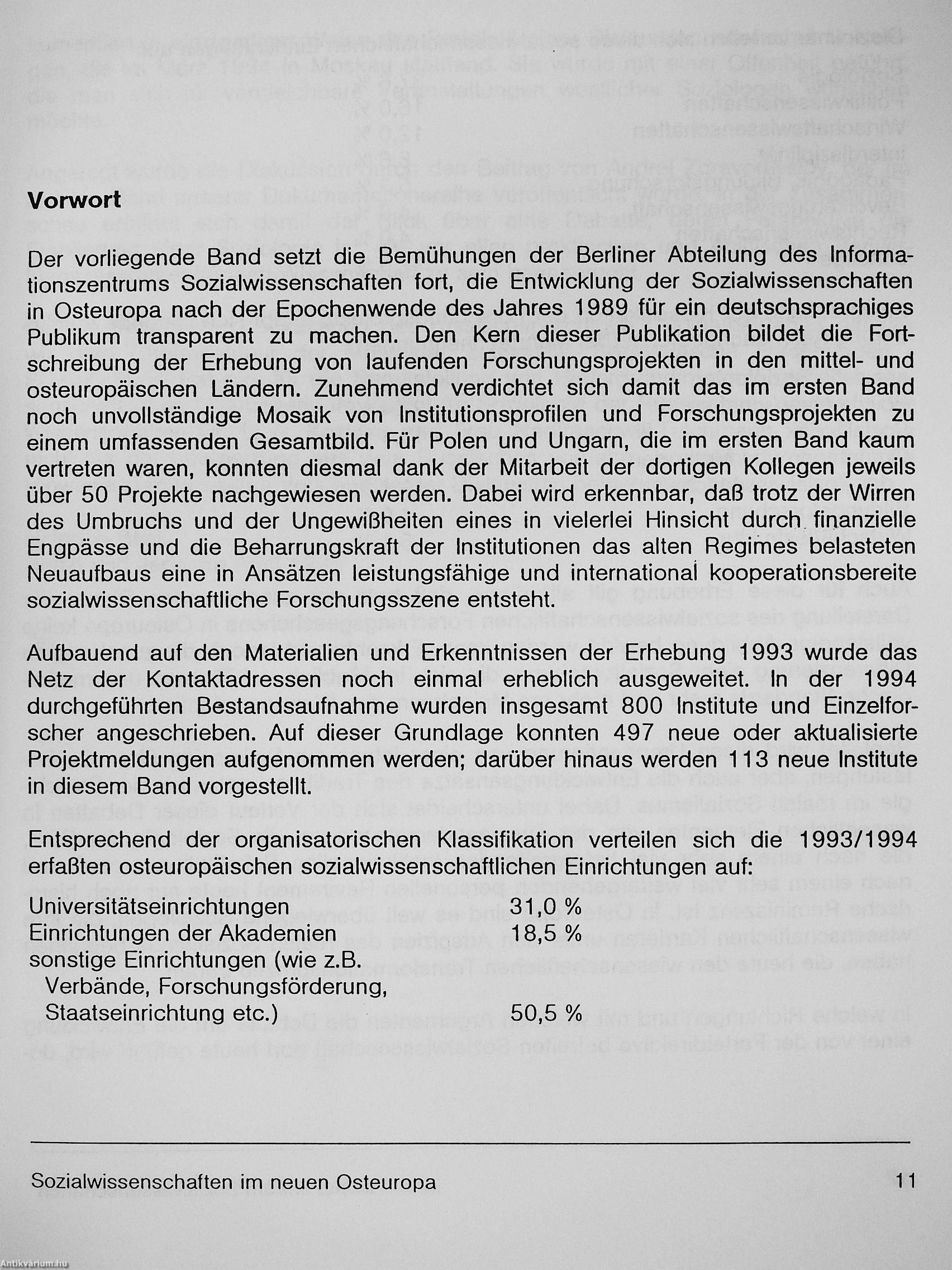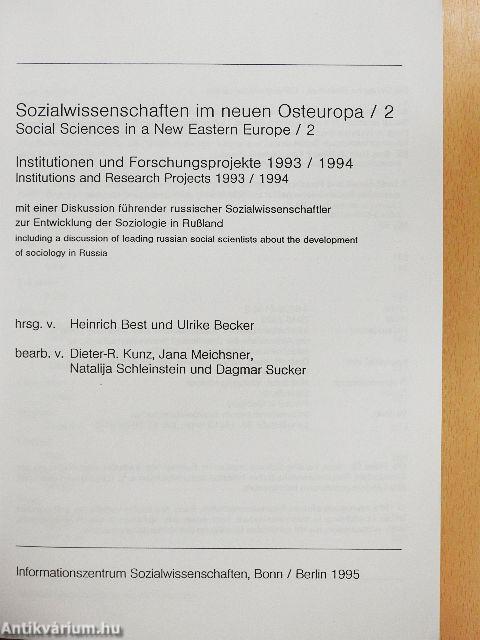1.067.339
kiadvánnyal nyújtjuk Magyarország legnagyobb antikvár könyv-kínálatát

VISSZA
A TETEJÉRE
JAVASLATOKÉszre-
vételek
Sozialwissenschaften im neuen Osteuropa 2.
Social Sciences in a New Eastern Europe 2. - Institutionen und Forschungsprojekte 1993-1994/Institutions and Research Projects 1993/1994
| Kiadó: | Informationszentrum Sozialwissenschaften |
|---|---|
| Kiadás helye: | Bonn-Berlin |
| Kiadás éve: | |
| Kötés típusa: | Ragasztott papírkötés |
| Oldalszám: | 628 oldal |
| Sorozatcím: | Europe in Comparison |
| Kötetszám: | 3 |
| Nyelv: | Német Angol |
| Méret: | 24 cm x 17 cm |
| ISBN: | |
naponta értesítjük a beérkező friss
kiadványokról
naponta értesítjük a beérkező friss
kiadványokról
Előszó
TovábbFülszöveg
Europe in Comparison . ; :
A Series of Guideboolo for tfie Social Sciences ,
edited by Heinrich Best and Peter Flora on be01i of: InformationsZentrunn Sozialwissenschaften, Bonn, and Mannheimer Zentrum für Europäische Soiiätforschung
The series is an attempt to support coniijarative social science research on Europe by proyiding a broad range of meta-information required in cptiipäring societies and polities across Europe. The variety of national differences, cultural as well as institutional, .f^resent a considerable barrier to be overcome in transnational comparative research. Social scientists hr'e face far greater difficulties than in their national contents while at the same time their • institutional support is W^ker.
The series is intended to contribute to comparative research by offering systernatic meta-information in four fields:
(1) Quantitati\?e data and source information provided by institutions iaiiie European countries - aspects such as the definition and... Tovább
Fülszöveg
Europe in Comparison . ; :
A Series of Guideboolo for tfie Social Sciences ,
edited by Heinrich Best and Peter Flora on be01i of: InformationsZentrunn Sozialwissenschaften, Bonn, and Mannheimer Zentrum für Europäische Soiiätforschung
The series is an attempt to support coniijarative social science research on Europe by proyiding a broad range of meta-information required in cptiipäring societies and polities across Europe. The variety of national differences, cultural as well as institutional, .f^resent a considerable barrier to be overcome in transnational comparative research. Social scientists hr'e face far greater difficulties than in their national contents while at the same time their • institutional support is W^ker.
The series is intended to contribute to comparative research by offering systernatic meta-information in four fields:
(1) Quantitati\?e data and source information provided by institutions iaiiie European countries - aspects such as the definition and operationalisation of concepts, the collection and processing of data, their storage and access will be covered/
(2) .the national institutions engaged in empirical research in the social sciences, with an explicit or implicit comparative ¦perspective - the information will cover aspects such as their
: ^organisation and research orientation, their activities and publications
(3) Bibliographical documentation and research information referring to the methodology, infrastructure and results of social science research in Europe - special emphasis will be laid on meta-information systems available at national and supranational levels
(4) Bibliometric and scientometric analysis of social science research cultures in European countries with particular reference to cultural implications for social science theory and research techniques.
Volume 3
Sozlalwissenschaften im neuen Osteuropa 1993/1994
(Social Sciences in a New Eastern Europe) ;:
edited by Heinrich Best and Ulrike Sec/cer yiv/X-i;;-^^^
The third volume of this documentation series ?ohtiniies;^^^^ information service to provide all those-iptéfesjtéd hí:ü(k^ date information on current research.projecis ffldWso^ institutions in the social sciences of EaslémJáMj'Cfefll^ EiJ- : rope. ' • ¦ ¦ ¦¦:¦¦¦¦ :¦¦ :
Data acquisition and collection are báséd on'^ari aniiüársurvey' conducted among and reported by researehiftstitutiohs and ' social scientists in Eastern and Central Europe:. :
Using materials and knowledge gath'ered.in:the 1993 survey, we have been able to extend the networkdf contact addresses even further. IVIore than 800 institutesand individual researchers were contacted in 1994. This enabled us to include 497 new or updated project reports and il3 new institutes into this volume. Though research in Eastern Europe is covered with an ever-growing comprehensiveness, this documentation does not and cannot lay claim toSaSwiute completeness of coverage. This problem vvill be compensated'by-the' longitudinal character of the documentation series so that its information value will contmuously enhance.
Thus the mosaic of institution profiles and research projects , started in the first edition is complemented to an all-encom-passing overall picture. Despite the turmoil and uncertainties of the current transition process, that put a heavy strain on the region's reconstruction and which are further aggravated by financial bottlenecks and the persistence of institutions taken over from the old regime, It is becoming increasingly apparent, that a promising research community is emerging In the field of the social sciences with a great potential and a vested interest in International co-operation: Another important feature is the growing differentiation of spcia] science research in these countries and an increasirig orientation towards the Western mainstream as far as ihernés.átitf méthods are concerned.
The new directions;and átgumenis.wittíln the debate on the further devefo'pmentoifsbci^t scié«Cftí:n the Eastern European countries- once it has oeen f'eed:'«)™ party directives - are uniquely highlighted by thg.ofJe'n'ins cqntnbutlon In this volume: the protocol bf a/distiissiorta-TO sociologists which took place in Moscovv ÍB'.Má'ri:tí':1:994 and was induced by a contributiOrr fjy AndíéfZBfávfliiiySlév.that had been published in the previóus'v0füWe:of'0iir.;iiqeum Vissza












